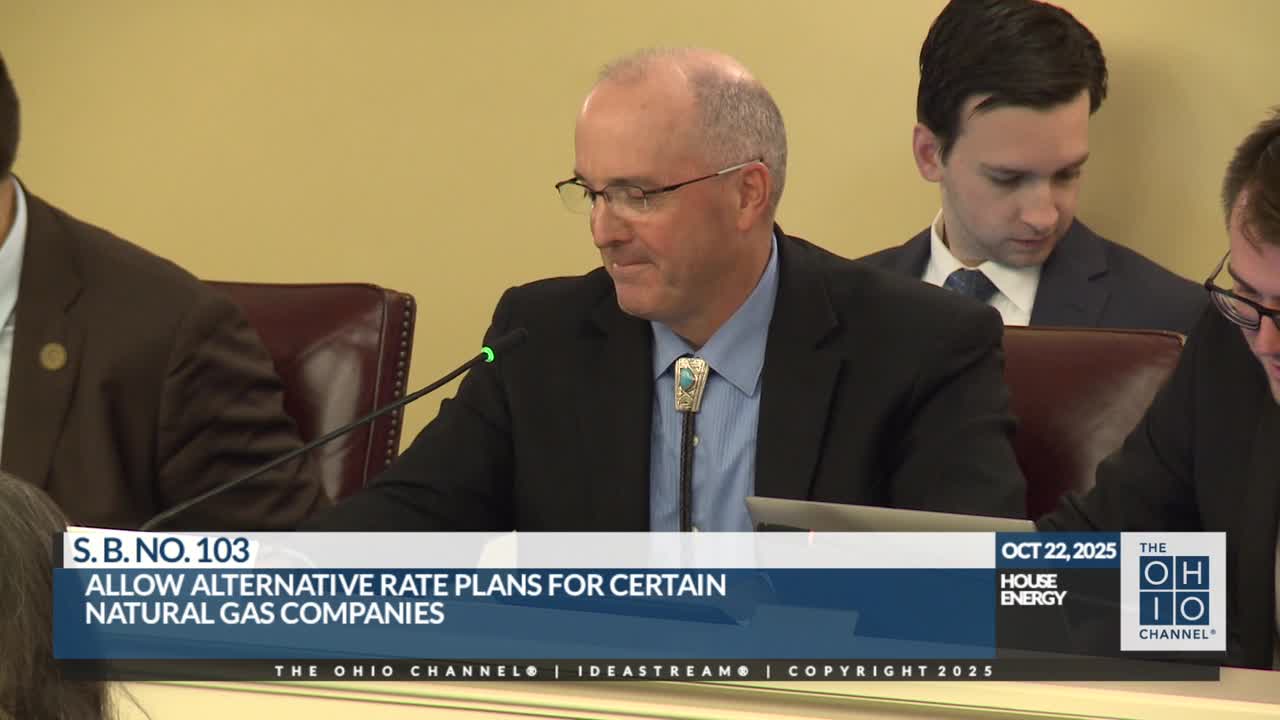Committee Hears Sponsor Testimony on Multiyear Rate-Making for Gas, Water and Wastewater
Get AI-powered insights, summaries, and transcripts
Subscribe
Summary
Senator Wilkin testified to the Ohio House Energy Committee on amended substitute Senate Bill 103, which would allow multiyear rate-making for natural gas, water and wastewater utilities, require large utilities to file rate cases on a schedule, preserve some existing riders for small utilities and add protections for large-customer contracts.
Senator Tim Wilkin, sponsor of amended substitute Senate Bill 103, told the Ohio House Energy Committee that the bill would align natural gas, water and wastewater rate-making with electric rate-making established in Substitute House Bill 15 and allow multiyear rate plans for up to three years.
The bill “was unanimously voted out of the senate chamber on 10/15/2025,” Wilkin said in testimony to Chair Holmes and committee members, adding it would create regulatory symmetry across utility types and “unlock utility investment” while protecting consumers through more regular review of costs.
Under the version discussed, utilities that elect multiyear rate-making would have current costs rolled into rates as approved by the Public Utilities Commission of Ohio (PUCO). Wilkin said utilities serving 250,000 customers or more would be required to file for a rate case with PUCO every three years, and that those filings must be made no later than Dec. 31, 2029, for qualifying natural gas utilities.
Wilkin described a “true up” process written into the bill that would require companies to reconcile forecasts with actual spending: "they will have to open their books and show that what they said they were going to spend that they spent and if they underspend then their rates can come down," he said. He also said the bill allows smaller utilities that serve fewer than 250,000 customers to continue using the current rate-making paradigm so they are not forced into expensive rate-case processes.
The bill retains an infrastructure development rider (IDR) as an exception to the roll-in of riders into base rates. Wilkin said the IDR — which he described as “a valuable tool for economic development” — is capped at $1.50 for all customers. He gave an example of the IDR being used to extend gas lines for large projects.
On large-load customer agreements, Wilkin said the bill would prevent costs associated with privately negotiated contracts from being passed on to other customers: "Cost for these private contracts cannot be passed on to other customers for the cost associated with providing service to the large load customer," he said. The bill would require PUCO to adopt a document that, upon approval of such agreements, must be signed by the gas company stating it will not pass on those costs; Wilkin said failure of such a private contract could not be cited later as a reason to raise ordinary customer rates.
Committee members asked clarifying questions. Representative Davila asked what final changes had been made in the Senate prior to passage; Wilkin offered to have staff provide the committee with a summary. Representative Ritter asked for examples of how the IDR would work; Wilkin described using IDR funds to extend infrastructure to land or serve a large customer. Representative Brennan and others asked about riders under the bill; Wilkin said once a company receives approval for a forecasted test year, most other riders would be rolled into base rates and no additional riders would be approved to recover capital investment beyond base rates, with the IDR and statutorily allowed pass-throughs as exceptions.
No committee vote was taken; the sponsor’s appearance was recorded as the bill’s first hearing before the committee.
